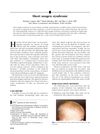Short Anagen Syndrome: A Case Study
January 2012
in “
Journal of Cosmetics, Dermatological Sciences and Applications
”

TLDR The document concluded that certain clinical signs and hair growth tests help diagnose Short Anagen Syndrome.
The document "Short Anagen Syndrome: A Case Study" from 2012 presented a case study on Short Anagen Syndrome, a condition where the anagen growth phase of hair follicles is shorter than normal. The study highlighted the clinical characteristics and trichogram findings that aid in diagnosing this trichosis. The authors did not declare any conflicts of interest.








